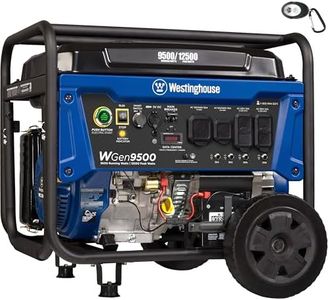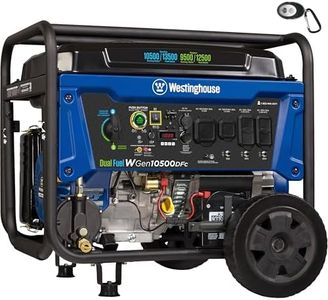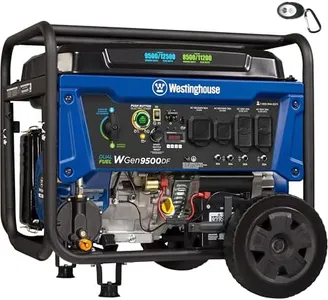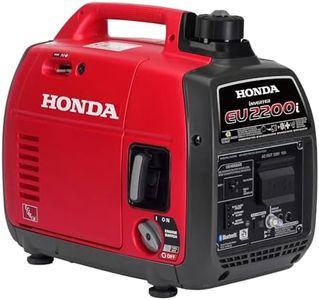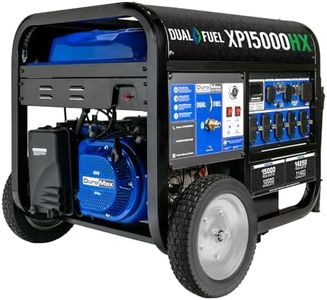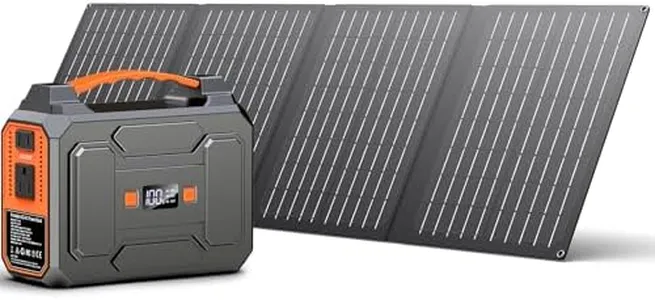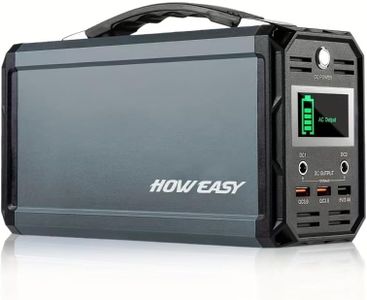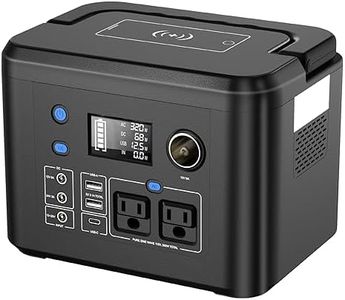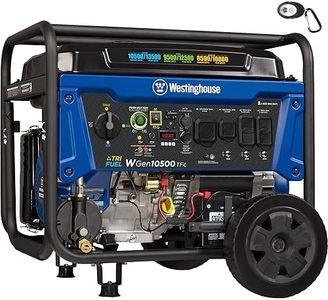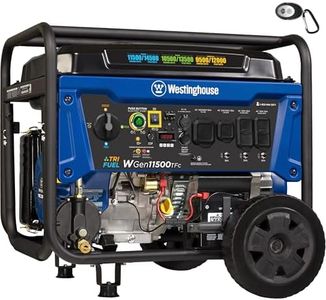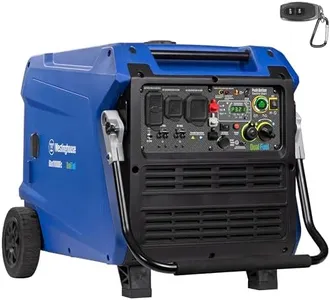10 Best Power Generators 2026 in the United States
Our technology thoroughly searches through the online shopping world, reviewing hundreds of sites. We then process and analyze this information, updating in real-time to bring you the latest top-rated products. This way, you always get the best and most current options available.

Our Top Picks
Winner
Westinghouse Outdoor Power Equipment 12500 Peak Watt Home Backup Portable Generator, Remote Electric Start with Auto Choke, Transfer Switch Ready 30A & 50A Outlets, Gas Powered
Most important from
27426 reviews
The Westinghouse Outdoor Power Equipment 12500 Peak Watt Home Backup Portable Generator is a robust option for residential use. It delivers a substantial power output with 9500 running watts and 12500 peak watts, making it suitable for powering essential household appliances during outages. The generator is gas-powered, which is commonly available and reliable for home use. It boasts a 6.6-gallon fuel tank that provides up to 12 hours of run time, which is fairly efficient for prolonged power outages.
Its starting options are user-friendly with remote start via a key fob, electric start, and recoil start, catering to various user preferences. The inclusion of multiple outlets, including standard household receptacles, RV ready outlets, and USB ports, adds versatility and convenience for different power needs. Safety is enhanced with rubber covers on all outlets and features such as automatic low oil shutdown. However, weighing 220 pounds, it may be cumbersome to move despite being labeled as portable.
The package includes useful accessories like a battery charger, oil, and a tool kit, simplifying initial setup. Backed by a 3-year limited warranty and supported by nationwide customer service, it offers a reliable backup power solution for homeowners. Potential buyers should be aware of the generator's weight and potentially check noise levels if that is a concern for their specific environment.
Most important from
27426 reviews
Westinghouse 13500 Peak Watt Dual Fuel Home Backup Portable Generator, Remote Electric Start, Transfer Switch Ready, Gas and Propane Powered
Most important from
27426 reviews
The Westinghouse 13500 Peak Watt Dual Fuel Generator is a strong choice for homeowners needing reliable backup power during outages. Its high power output—up to 13,500 starting watts and 10,500 running watts on gasoline—can comfortably handle multiple household essentials at once. Running on either gasoline or propane gives you fuel flexibility, which is great if one type runs low. It can run up to 19 hours on a full 9.5-gallon gas tank, meaning it can last through a long power outage without refueling frequently.
The generator is equipped with a remote electric start via a key fob, making it easy to turn on without going outside, plus a recoil start as a backup. Safety features like automatic low oil and carbon monoxide shutdown add peace of mind, especially for home use. It offers several outlets, including standard household plugs, a transfer switch-ready outlet for seamless home integration, and an RV outlet, covering various connection needs. Portability is moderate; weighing 230 pounds, it’s not something you’d carry by hand easily, but it’s designed for stationary use at home rather than frequent moving.
Though this model may produce noticeable sound typical of heavy-duty generators, considering placement away from living areas can help manage noise impact. It also includes useful extras like a fuel gauge, hour meter, and USB port for smaller devices. Despite being somewhat heavy and potentially noisy, its power capacity, dual fuel option, and user-friendly start features make it a practical and dependable backup generator for most households.
Most important from
27426 reviews
Westinghouse 12500 Watt Dual Fuel Home Backup Portable Generator, Remote Electric Start, Transfer Switch Ready, Gas and Propane Powered
Most important from
27426 reviews
The Westinghouse 12500 Watt Dual Fuel Home Backup Portable Generator is a robust and versatile power solution, ideal for home backup during outages. Its dual fuel capability allows you to use either gasoline or propane, providing flexibility based on availability and preference. The generator boasts a high power output with 9500 running watts and 12500 peak watts on gasoline and slightly lower on propane, making it capable of running multiple household appliances simultaneously.
The 12-hour run time on a full tank (6.6 gallons) ensures extended operation without frequent refueling. The remote electric start and included key fob add convenience, making it easy to start the generator from a distance. Additionally, the unit includes various outlets, such as standard household, transfer switch ready, and RV ready, with rubber covers for added safety. The heavy-duty 457cc engine with automatic low oil shutdown and a cast iron sleeve enhances durability. The digital hour meter and VFT display provide real-time updates, which can be very handy for monitoring use and maintenance needs.
The generator is quite heavy at 210 pounds, which may affect portability despite being labeled as portable. The generator comes with a comprehensive set of accessories and minimal assembly is required, making it user-friendly right out of the box. The 3-year limited warranty and nationwide customer service network provide additional peace of mind. This generator is best suited for those needing a reliable home backup power source with high wattage and dual fuel flexibility.
Most important from
27426 reviews
Buying Guide for the Best Power Generators
Choosing the right power generator can be a crucial decision, whether you need it for home backup, camping, or work sites. The right generator will ensure you have a reliable power source when you need it most. To make an informed decision, you need to understand the key specifications and how they align with your specific needs. Here are the main specs to consider when selecting a power generator.FAQ
Most Popular Categories Right Now
